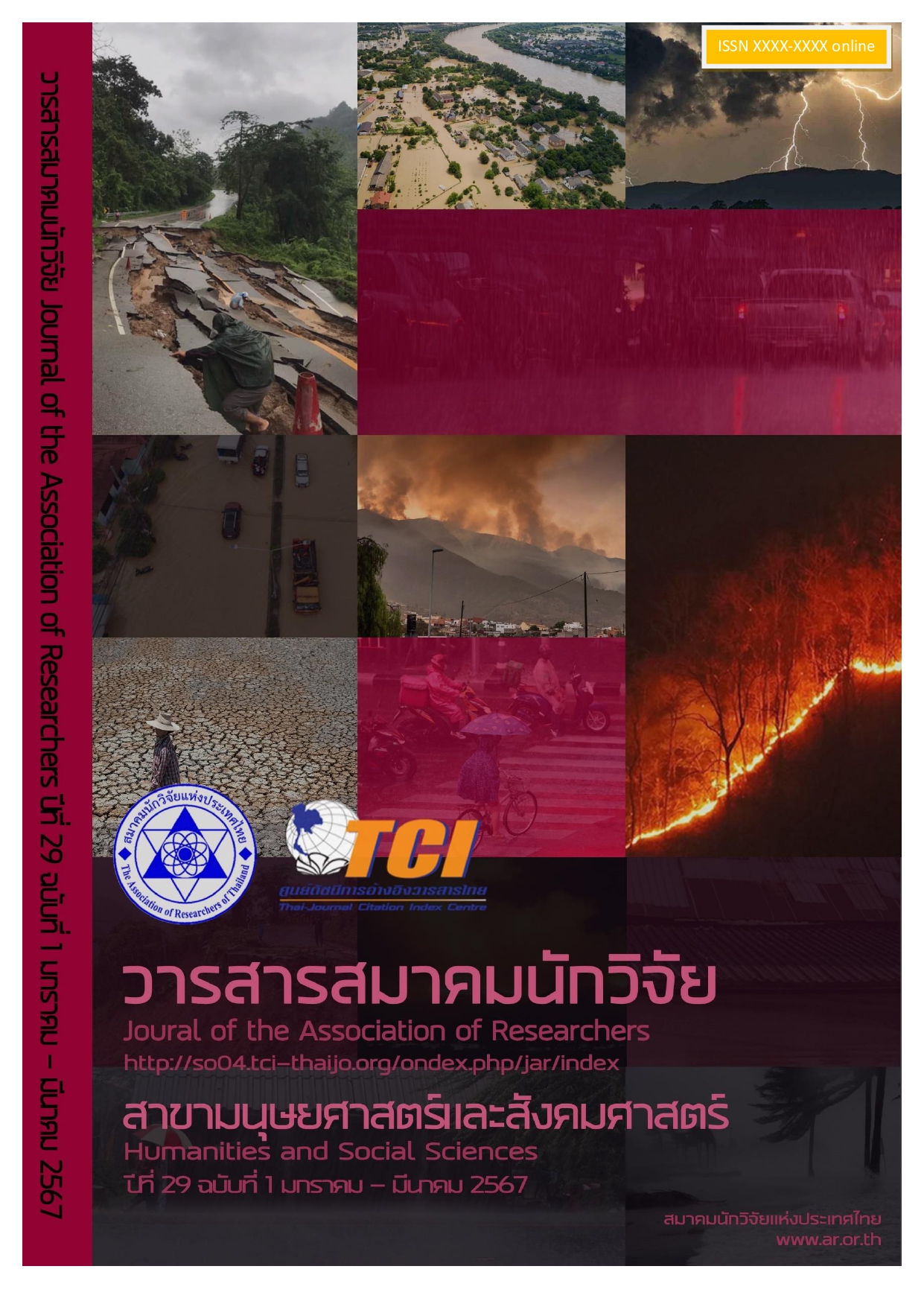The psychological characteristic of the sports achievement of athletes of Thailand National Sports University, Suphanburi campus. In 46thPhysical Education Games, Year 2023.
Main Article Content
Abstract
The purposes of this research were to study the Psychological Characteristics factors to the sport's achievement in love, earnestness and proud of the playing sport Reward and being famous and Self-controlling for a fully ability of development at the higher level. The research sample were 321 athletes by purposive sampling from Thailand National Sports University, consisting of 220 males and 101 females, aged between 18-22 years, preparing to participate in Year 2023. The measurement tools assessing to the characteristics of sports achievement were the structural validity values at 0.88. Statistics used in data analysis were mean, standard deviation. Research finding indicated that:The Psychological characteristic of sports achievement showed ranking from the most to the least that 1) in the aspect of love, earnestness, and proud of the playing sport were rated at a high level with 42.43 points, 2) in the aspect of self-controlling for a full ability of development was rated at a high level with 40.68 points, and 3) in the aspect of reward and being famous were rated at a moderate level with 33.53 points. Studying mental characteristics will allow you to know problems and obstacles in your thinking and be able to create guidelines or methods to enhance motivation for athletes to have a thirst for victory and to develop skills that express good and effective abilities that result in results. continue the competition This will help athletes to develop themselves to a higher level of ability in the future.
Article Details

This work is licensed under a Creative Commons Attribution-NonCommercial-NoDerivatives 4.0 International License.
บทความที่ปรากฏในวารสารนี้ เป็นความรับผิดชอบของผู้เขียน ซึ่งสมาคมนักวิจัยไม่จำเป็นต้องเห็นด้วยเสมอไป การนำเสนอผลงานวิจัยและบทความในวารสารนี้ไปเผยแพร่สามารถกระทำได้ โดยระบุแหล่งอ้างอิงจาก "วารสารสมาคมนักวิจัย"
References
ฉัตรตระกูล ปานอุทัย. (2562). ผลการฝึกในภาวะพร่องออกซิเจนที่มีความหนักต่างกันที่มีต่อสภาวะอารมณ์และความสามารถในการใช้ออกซิเจนสูงสุด. ปริญญานิพนธ์ดุษฎีบัณฑิต สาขาวิชาวิทยาศาสตร์ การออกกำลังกายและการกีฬา บัณฑิตวิทยาลัย มหาวิทยาลัยศรีนครินทรวิโรฒ.
ธนิดา จุลวนิชย์พงษ์, และคณะ. (2553). การพัฒนาแบบสอบถามความเข้มแข็งทางจิตใจฉบับภาษาไทย. วารสารวิทยาศาสตร์ออกกำลังกายและการกีฬา. 7, 1-14.
ธีระศักดิ์ อาภาวัฒนาสกุล. (2552). หลักวิทยาศาสตร์ในการฝึกกีฬา. กรุงเทพฯ: จุฬาลงกรณ์มหาวิทยาลัย.
วาจาสิทธิ์ ลอเสรีวานิช. (2552). วุฒิภาวะทางอารมณ์: ปัจจัย สำคัญของคน ทีมงาน องค์กรที่ประสบความสำเร็จ (ตอนที่ 1). Go training magazine (24), 12. สืบค้นเมื่อ 15 พ ฤ ษ ภ า ค ม 2555. จากhttp://www.radompon.com/resourcecenter/?q = node/47.
วิชัย ยีมิน, และคณะ. (2561). ปัจจัยทางจิตใจและยุทธวิธีทางจิตใจในช่วงการ ฝึกซ้อมของนักกีฬาฟุตซอลชั้นเลิศ: จำแนกตามตำแหน่งการเล่น. วารสารวิทยาศาสตร์และเทคโนโลยีการกีฬา.18(1).
พานิช ไชยศรี. (2534). หลักวิทยาศาสตร์ในการฝึกกีฬา. กรุงเทพฯ: กรมพลศึกษา.
นิกร สีแล. (2556). พื้นฐานวิทยาศาสตร์การกีฬา. พิมพ์ครั้งที่ 1. ชุมพร: ชุมพรปริ้นแอนดีไซน์.
สมบัติ กาญจนกิจ, และ สมหญิง จันทรุไทย. (2542). จิตวิทยาการกีฬาแนวคิดทฤษฎีสู่การปฏิบัติ. กรุงเทพฯ : จุฬาลงกรณ์มหาวิทยาลัย.
สุปราณี ขวัญบุญจันทร์. (2545). จิตวิทยาการกีฬา. กรุงเทพฯ: ไทยวัฒนาพาณิช.
สุพัชริน เขมรัตน์. (2562). จิตวิทยาการกีฬาพื้นฐานแนวทางการนำไปใช้. กรุงเทพฯ: มหาวิทยาลัยธรรมศาสตร์.
สุพิตร สมาหิโต. (2535). จิตวิทยาการกีฬากับโค้ช. กรุงเทพฯ: มหาวิทยาลัยเกษตรศาสตร์.
โสภิต สุวรรณเวลา, และคณะ. (2562). ความวิตกกังวลและการจัดการความวิตกกังวลของผู้ปกครองที่มีบุตรป่วยเข้ารับการรักษา ในหอผู้ป่วยกุมารเวชกรรมโรงพยาบาลศูนย์ตรัง. วารสารวิทยาลัยพยาบาลบรมราชชนนีอุตรดิตถ์, 11, (1)55.
สำราญ สุขแสวง. (2560). การสร้างโปรแกรมการสร้างเสริมสมรรถภาพทางกายสำหรับนักมวยไทยอาชีพ. วิทยานิพนธ์ศิลปศาสตรดุษฎีบัณฑิต สาขาวิชามวยไทยศึกษา บัณฑิตวิทยาลัย มหาวิทยาลัยราชภัฏหมู่บ้านจอมบึง.
อาพรรณชนิต ศิริแพทย์. (2557). การจินตภาพทางการกีฬาแบบแพ็ทเลป (PETTLEP), วารสารวิทยาศาสตร์การกีฬาและสุขภาพ. 15(2),1-12.
Burton, D. In R. N. Singer, M. Murphey & L. K. Tennant. (1993). Goal setting in sport. Handbook of research on sport psychology, (p.21). New York: McMillian.
Gill, D. L. (1986). Psychological dynamics of sport. Champaign, IL: Human Kinetics.
Locke, E. A., & Latham, G. P. (1975). A theory of goal setting and task performance. Journal of applied psychology 60 (3), 340.
Tabachnick, B. G., & Fidell, L. S. (1996). Using Multivariate Statistics (3rd ed.). New York: Harper Collins.
Translates in Thai Reference
Arphawattanasakul, T. (2009). Principles of sports science in sports coaching. Bangkok: Chulalongkorn University.
Chaisri, P. (1991). Principle in sports science. Bangkok: Department of Physical Education.
Julawanitpong, T., et al. (2010). The development of sport psychology questionnaire. Journal of Exercise and Sport Science (Thai version), 7, 1-14.
Julawanitpong, T., et al. (2010). The mental toughness structural relationships for Thai athletes. Bangkok: Sports science department, Sports authority of Thailand.
Kwanboonchan. S. (2002). Sports psychology. Bangkok: Thaiwattanapanich.
Kanchanakif, S., et al. (1999). Sports psychology (theory to practice). Bangkok: Chulalongkorn University.
Kemarat, S. (2010). The fundamental of sports psychology (methods and uses). Bangkok: Thammasat University.
Lorsereewanich, W. (2009). Emotional maturity: Factors, person, team, and success organization (part 1). Go training magazine (24) search on 5 May 2012. from http://www.radompon.com/resourcecenter/?q= node/47
Panuthai, C. (2019). Effects of hypoxia training at different intensity on mood state and maximum oxygen consumption. Dissertation, Ph.D, Srinakharinwirot University, Bangkok.
Samahito, S. (1992). Sports psychology for coach. Bangkok: Kasetsart University.
Srilae, N.. (2013). Fundamental of sports science. Chumphon: Chumphon printed and design.
Suksawaeng, S. (2017). Physical Toughness program for Muaythai professional. M.A. (thesis),Muaythai study, Graduate School. Rajabhat Mooban Jombueng University.
Khuanboonchan, Supanee. (2002). Sports psychology. Bangkok: Thaiwattanapanit.
Suwan S, et al. (2019). Anxiety and Anxiety management of Parents with ill children admitted to Pediatric Department Trang Center Hospital. Boromarajonani College of Nursing, Uttaradit Journal, 11(1), 55.
Siripatt, A. (2014). The PETTLEP imagery model for sport. Journal of Sports Science and Health, 15(2), 1-12.
Yeemin, W., et al. (2008). Mental factors and strategies for Futsal training excellence. Journal of Sport Science and technology.18(1), 66.
Wongchaturaphat, N., et al. (2008). Factors effecting to guidelines mental toughness of Sepak trakraw players. Chonburi: Bangkok: Sports science department, Sports authority of Thailand and Faculty of sports science. Burapha University.


